Subscribe by Email
-
Recent Posts
Author Archives: Susan
Wordfest, Princes, and Just Kids

I’m just now catching up as last week was busy because our city’s annual writer/book festival called Wordfest was going on. I attended many of the book readings and talks, which were wonderful as usual. Of course a slew of Canadian authors read from their works including: Lawrence Hill, Patrick DeWitt, Nick Cutter (a.k.a. Craig Davidson), Elizabeth Hay, Andre Alexis, and Marina Endicott. Have you read any of these authors? I’m curious to read Lawrence Hill’s new novel “The Illegal,” which seems to be a big departure from his 2007 epic “The Book of Negroes.” I also hope to read Elizabeth Hay’s 2007 Giller prize-winning novel “Late Nights on the Air,” which I bought at the festival and had her sign.

Other authors I heard at Wordfest included: John Vaillant, Hannah Kent, Sarah Winman, Sara Blaedel, Cecilia Ekback, Yrsa Sirgurdardottir, and former child soldier Michel Chikwanine whose talk was very tragic and powerful. There were some neat discussions, and I was impressed by all the authors — some of whose books I’ve read. I especially liked Australian author Hannah Kent who was well spoken and is very bright for her years. Her bestselling 2013 novel “Burial Rites” has been translated into 23 languages and was written in her twenties. Have you read it yet?
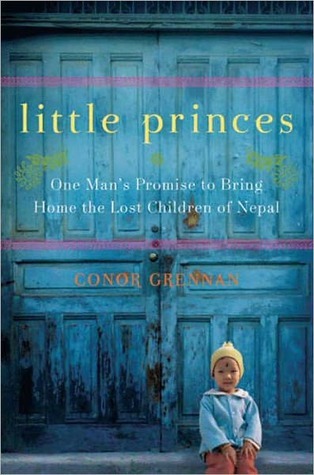
Meanwhile last week I finished the 2011 nonfiction book “Little Princes: One Man’s Promise to Bring Home the Lost Children of Nepal” by Conor Grennan. It’s not a genre I read often — that of a person going to a developing country, significantly helping others, and writing about his or her experiences — but I usually seem to benefit when I do as I often learn quite a bit in the process. This book was no exception, in fact “Little Princes” is as good as similar books — though I haven’t read Greg Mortenson’s “Three Cups of Tea yet — but “Little Princes” is informative and compelling. I read it for my book club, which plans to discuss it this week.
It’s about Conor Grennan who at the age of 29 in 2006 goes to Nepal — during the midst of a bloody civil war — to volunteer for three months at “Little Princes” orphanage. Reluctant at first to be a caretaker, Conor soon finds himself won over by the kids’ resiliency and fun nature. But while there he discovers a stunning truth: that they’re not really orphans but have been taken from their families like many others in the country, tricked by human traffickers promising the children’s safety from war for large sums of money. The traffickers in turn have typically either sold the kids into slavery, or left them somewhere terrible to fend for themselves — the lucky ones being the kids who’ve made it to the Little Princes orphanage or other safe havens.
Once stateside, Conor springs into action, starting a nonprofit organization to help rescue the lost or trafficked children of Nepal. He returns to the country and makes the dangerous journey to remote villages to contact the parents of “Little Princes” children, letting them know what’s happened to their kids and informing them of their whereabouts. Eventually Conor establishes a new orphanage in Katmandu to help save more children.
It’s commendable — his story and effort, and how much the organization he co-founded — Next Generation Nepal — has done to rescue hundreds of kids in Nepal and reunify them with their families. He put his life in danger a number of times to make it happen. I’m amazed by people such as Conor, who go against great odds to make the world a better place for others. The book kept my attention and is told very openly and modestly. It gives a vivid picture of the kids in the orphanage and what it was like then inside war-torn Nepal. There’s even a bit of a long-distance relationship Conor shares of a girl he comes to rely on stateside. So if you like books such as “Three Cups of Tea,” you might also like “Little Princes.”

Finally last week, I listened to the audiobook of Patti Smith’s 2010 memoir “Just Kids.” About time, right? She has a new book out now called “M Train, which reminded me to get on the stick about her first book. I had always wanted to read “Just Kids” even though I wasn’t a huge follower of Smith’s music or poetry. I remember in college my roommate always played Smith’s 1975 album “Horses” which I thought was definitely cool but different and a bit weird. I was a fan of her song “Because the Night” which she co-wrote with Bruce Springsteen. In fact, I really wanted to hear about this collaboration and song in the book but alas it’s only briefly mentioned in “Just Kids.”
Most of the memoir of course is about her relationship with artist and photographer Robert Mapplethorpe, who was her world back when they were both starting out as artists in New York City. And it’s great that Patti Smith reads the audiobook. I found her quite down to earth and articulate, relating how her life unfolded and was back then. She pronounces her prose clearly as a poetess would. In her memoir she doesn’t seem too weird or strung out on drugs and I liked her sensibility. In fact the book hardly talks about drugs or alcohol, which is pretty refreshing for a rock memoir. Instead what I took away from “Just Kids” was:
** the places Smith frequented (such as the Chelsea Hotel and CBGB etc.) and the atmosphere of New York City back in the ’60s and ’70s, as well as the famous folks Smith knew there. I had no idea she had a relationship with Sam Shepard once; wow he must have been a real looker back then!
** the deep and touching bond she had with Robert Mapplethorpe, long after they went on to other relationships and muses
** the perseverance of both Smith and Mapplethorpe to make it as artists and be themselves, how they supported each other and didn’t sell out their dreams — was pretty incredible
All of that struck me in the book. And although I haven’t been a huge fan of her music or poems, I respect Patti Smith, her commitment to her artistry, and what she was able to do. And I’m glad to have finally gotten to her illuminating and poignant memoir “Just Kids.”
What about you — have you read any of these books mentioned above, and if so, what did you think?
Posted in Books
18 Comments
Did You Ever Have … and Wolf Winter

Somehow I missed jumping on the overall bandwagon for Bill Clegg’s popular 2015 novel “Did You Ever Have a Family.” I know everyone raved about it. I know some called it “the best novel of the year.” I know it was longlisted for the Man Booker Prize. I know I should have liked it a whole lot more, but somehow alas it didn’t turn out that way, and I’m still wondering a bit why.
I listened to “Did You Ever Have a Family” as an unabridged audiobook, and at the time, for some reason, I didn’t realize it was the author who was reading it. Usually I love when the author reads their own book for the audio (especially with memoirs — it’s terrific) but sometimes with novels it’s not so great — as was the case this time. Clegg read it in a monotone voice and didn’t differentiate between any of the many characters. I found myself questioning, “Is this guy getting paid for this?” If I were the publisher, I think I would have found someone else, but alas, I adapted to his reading style.
It doesn’t spoil anything to say “Did You Ever Have a Family” is about a horrific tragedy that takes place in a small Connecticut town after four members of a wedding party, including the bride and groom, are killed in a fire the night before the wedding. That starts the book, and the rest of it delves into who these four people were, and how the tragedy affects their relatives’ and friends’ lives in the community after the terrible event.
Quite a lot of people inhabit the novel, including 10 who narrate the story in alternating chapters. The main characters are the bride’s mother, June, and the groom’s mother, Lydia — whose lives are shattered — but other narrators include the wedding caterer who never got paid, the teenage pothead who lives nearby, and the motel owners on the West Coast who assist June when she eventually settles there to get away. These characters are just the tip of the iceberg.
I liked parts of “Did You Ever Have a Family” — some of the details and descriptions stuck out, and the conversational tone was enticing. I also liked how one comes to learn much more about the characters’ histories than what happens at the beginning of the book.
But unfortunately I felt disconnected or distanced from quite a few of the characters. The many alternating narrators, some of whom are very peripheral to the story, seem to take away from the book’s focus. Unlike the novel “Station Eleven,” which also had a big cast of characters but which is great, this novel became lost and fell flat to me despite all of its characters’ tragedies.
And indeed there is a lot of tragedy and grief in “Did You Ever Have a Family.” Not only is there the main fire disaster, but there’s also cancer, rape, abuse, drug overdoses, and other mayhem among the peripheral stories. All of it felt pretty macabre to me. And although some of the characters find a bit of solace at the end, I was relieved when the novel was finally over.

In the meanwhile I finished off Cecilia Ekbäck’s 2015 literary murder-mystery “Wolf Winter.” Ekback is a Swedish-born author who now lives in my town and I met awhile back on Independent Bookstore day. I had wanted to read her debut novel before she and others appear at our annual book festival next week. So I dove into it and slowly made my way through its 405 pages.
“Wolf Winter” is a highly atmospheric novel that takes place in Swedish Lapland in 1717. It’s about a Finnish family who moves to a northern Sweden mountainside called Blackåsen, where only a handful of settler families live, occasionally mixing with the Laplanders. There the family comes across a dead body high up on the mountain, which some dismiss was killed by an animal, but the Finnish mother believes differently. She starts poking around asking questions, and as a brutal winter comes on, she begins to learn some disturbing truths about the area and the other settlers.
“Wolf Winter” conjures a vivid spooky and wintry atmosphere in a land where the King and Church rule supreme. The main characters are the Finnish mother, and her eldest daughter who feels a power from the mountain, as well as the area’s priest who must investigate the case and keep the settlers in line.
I really liked the book’s imagery and characters — the only trouble is I felt there could have been a bit more action among its many pages. A lot of the drama comes at the very end, but I wish more surrounding the culprits, their motives, or other happenstances would have been spread out across the story. As it was, the action seemed a bit hung up and I thought the novel could’ve been edited down shorter and tighter.
On its cover, I see that “Wolf Winter” has been compared to Hannah Kent’s novel “Burial Rites,” though I still need to read that one to see if there’s any truth to that. It might make for an interesting comparison.
What about you — have you read “Did You Ever Have a Family” or “Wolf Winter” and if so, what did you think? Continue reading
Posted in Books
22 Comments
October Preview

October is here now and there’s a crispness in the mornings. It’s pretty outside though with all the leaves bright yellow and orange. It’s a fabulous time for a few last bike rides in the country. See my photo from earlier this week. It’s also a good month for a plethora of new releases.
In fiction, such popular authors as Geraldine Brooks, Jane Smiley, Adriana Trigiani, Kate Morton, and Robert Galbraith (a.k.a. J.K. Rowling) have new books coming out. Any of these I’m sure will be quite good. I like the character of Galbraith’s detective Cormoran Strike and his assistant Robin Ellacott. What happens to them in this third book in the series will be worth finding out.
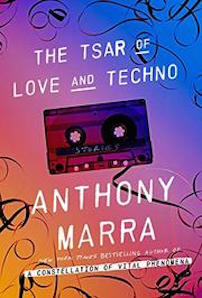
But for my book picks this month, I’m going to pick Anthony Marra’s collection of nine interconnected stories, all set in Russia, called “The Tsar of Love and Techno.” I’m curious to check it out because Marra’s debut novel “A Constellation of Vital Phenomena” received so many accolades when it came out in 2013 that I figure he’s a writer to flock to whenever he puts out something new. And judging by this book, he seems to continue to draw inspiration from the time he lived and studied in Eastern Europe.

I’m also interested to get a copy of Stacy Schiff’s new nonfiction book “The Witches: Salem, 1692.” Schiff last wrote about Cleopatra, and I still have that book on my shelf awaiting me. But now “The Witches” looks equally enticing. In her books, Schiff brings history vividly to life in accessible prose. And this time her research has delved into the infamous Salem witch trials — a chilling chapter in American history. Schiff’s book “The Witches” has been highly praised by historians David McCullough, Joseph J. Ellis, and Robert K. Massie among others.

Lastly in books, I’ll pick David Mitchell’s spooky new novel “Slade House” because it seems a perfect read for right around Halloween time. Apparently “Slade House” is an offshoot of Mitchell’s novel “The Bone Clocks,” but I think it might also be comprehensible as a stand-alone novel, or at least I hope so. I haven’t read Mitchell’s acclaimed novels “Cloud Atlas” or “The Bone Clocks,” but this upcoming one is his “shortest and lightest to date” says Publishers Weekly, so I’ll use it to check out the author’s much-talked about style and literary magic.
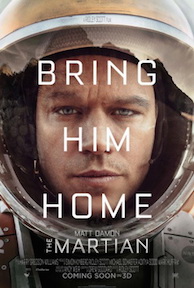
As for movies in October, there looks to be some great offerings. Of course as a reader of Andy Weir’s bestselling 2014 debut novel “The Martian,” I can’t wait to see the film adaptation with Matt Damon as Mark Watney. In fact, the previews look so good, I plan to see it this opening weekend. How could a team of astronauts leave Matt Damon (er, I mean Mark Watney) behind on Mars?! Oh my, No! With Ridley Scott directing, I figure “The Martian” is going to be a sure winner and it’s my pick for the month.
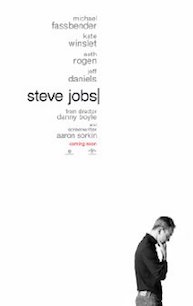
But there are at least two other strong film contenders. Holy smokes, the fact that Michael Fassbender is starring as Steve Jobs in the movie, with Danny Boyle directing, and Aaron Sorkin adapting the screenplay, has me now more interested in Steve Jobs than I ever was before. Fassbender is such a great actor to watch. I’ve seen him in “Prometheus” and “12 Years a Slave” both of which he was scary in but terrific. So it looks like the film “Steve Jobs” will undoubtedly be entertaining, and hopefully a bit more.
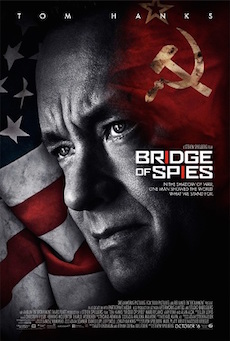
Lastly in October movies, I can’t pass up Steven Spielberg’s Cold War thriller “Bridge of Spies” from the adapted screenplay by the Coen brothers and Matt Charman, and starring Tom Hanks. My husband is a Cold War history buff and now has turned me into an enthusiast for such stories. We’ve seen and liked most of the films based on John le Carre’s novels. But alas, “Bridge of Spies” is based on the 1960 U-2 incident and has Tom Hanks playing a lawyer who is recruited by the CIA to help rescue an American pilot detained in the Soviet Union. Whether it’s a strong and balanced film, we will have to see.
Honorable mentions for other films this month go to: “The Walk” (too scary for my acrophobia); “Truth” (a must-see with Cate Blanchett in it); and “Room” (based on Emma Donoghue’s bestselling book but likely too rough for my claustrophobia).

If it’s new music you’re looking for in October, there’s new ones by female powerhouses Janet Jackson, Carrie Underwood, and Vanessa Carlton among others. But wait, Janet Jackson?! I don’t think she’s had a new album out since like 2008. I was going to pick Blue Rodeo’s “Live at Massey Hall,” but for old time sakes, I’ll go with Janet’s new “Unbreakable” album as my pick of the month. For all those ’80s fans, who out there remembers her lyrics: “Nasty boys don’t mean a thing. Oh you nasty boys”?
That’s it for new releases. So how about you — which books, movies, or albums out this month are you most looking forward to?
Posted in Top Picks
20 Comments
Watchman and Station Eleven

Last Sunday I turned 50, that’s right the dreaded 5-0, and to ease me over this middle-age hurdle my husband and I spent a getaway weekend in Aspen, Colorado, which is fabulous this time of year. It made it a very special occasion especially since I once lived there for a few years right after college. Back then, I skied and worked at the wonderful indie “Explore Booksellers” on Main Street, which thankfully still exists. It was a good life, and I’m not exactly sure now why I left. On this trip, we rented bikes and rode into the mountains to see the fall colors. It was gorgeous. See the Maroon Bells photo above.

While on the flights, I made my way through Harper Lee’s much-ballyooed novel “Go Set a Watchman.” If for some reason you were under a rock and didn’t hear, it’s about what happens when 26-year-old Jean Louise (Scout) returns home to Maycomb, Alabama from New York to visit her aging father, Atticus Finch. During her homecoming, set amid the tensions of the civil rights era, she learns some disturbing truths about her family, the town, and those closest to her.
Of course I was really hoping to like this one because of Lee’s classic “To Kill a Mockingbird,” which I had just reread this year, but alas it wasn’t to be. I should have known when Salman Rushdie mentioned just last weekend in the New York Times that he didn’t finish “Go Set a Watchman,” that it wasn’t a good sign. It’s not a hard book to read but I struggled with seeing it till the end too. It took me over a hundred pages to get into the novel, then I found the middle more interesting, but then the ending seemed to turn into a monologue argument that just felt no longer like a narrative.
There were parts I liked but on the whole I just didn’t care for “Go Set a Watchman.” And it wasn’t because of how Atticus had changed in this book, or its theme of Scout’s homecoming and her revulsion towards the racism she finds there. Those are interesting themes, but it just felt like an early draft. The narrative failed to grab me time and again and I struggled to get through it. I can see why Harper Lee never thought to publish this before because it wasn’t a final version.
What the book left me feeling was: what a great editor Lee must have had — not only to suggest the story instead be told from Scout’s childhood point-of-view — but also that her editor and Lee had apparently vetted and revised the manuscript so thoroughly together over years that it became “To Kill a Mockingbird.” Whether “Watchman” is valuable as a “literary artifact,” I’m still wondering about. I guess it is, but it doesn’t necessarily make me want to read through the trash bins of other writers for first drafts, despite how much I might want to hear a character — such as Scout’s — voice again.
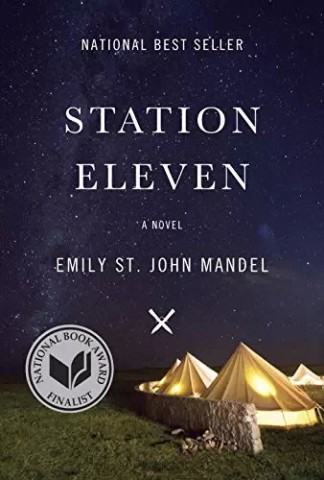
I was disappointed by it, but luckily Emily St. John Mandel’s 2014 novel “Station Eleven” came to the rescue. I know most bloggers raved about this novel last year, but I’ve finally just gotten to it. I listened to it last week as an audiobook read by actress Kirsten Potter who did a wonderful job. Holy smokes, what an entertaining book! I plan to read it in print as well though my husband just snagged my paperback copy of it.
Although it’s a post-apocalyptic novel, “Station Eleven” is not your typical gory tale about the immediate aftermath of a horrific event. It focuses mostly 20 years after a flu pandemic has wiped out most of the world’s population and is about the new culture that emerges among survivors and their settlements. It’s still scary and suspenseful, though at times it’s funny and endearing too.
What makes the story so great is the wide array of characters in it that are brought to vivd life, which includes a famous actor, a traveling symphony, a comic book writer, a corporate consultant, and a paparazzo. These people’s lives end up connecting or reconnecting in interesting ways as they travel about. I loved how the story circled around and all came together. You have to pay attention though because the novel jumps around in time quite a bit and from one characters’ story to the next, but despite the jumpiness, “Station Eleven” seemed pretty easy to follow and quite manageable.
I won’t soon forget the characters of Arthur Leander and Miranda and Jeevan too. They were my favorites. I loved as well how “Station Eleven” is set both in Canada and the Midwest. My husband and I have been to Toronto, and Denman Island on the West Coast, which is fictionalized in the book as Delano Island, which is Arthur’s hometown.
Apparently as the author has said in interviews, “Station Eleven” was meant as a “love letter to the modern world” and all the wonderful things we take for granted from it on a daily basis, which the survivors in the book don’t have. She’s talking about electricity, heat, plane travel, and the Internet among other things. It’s wonderful too how creative the novel is and how it focuses on the arts as an integral part of the world to save and keep going. As “Station Eleven” makes clear “Survival is insufficient.”
What about you — what are your thoughts on Harper Lee’s “Go Set a Watchman,” or Emily St. John Mandel’s “Station Eleven”? Continue reading
Posted in Books
32 Comments
Stoner and Oliver Sacks
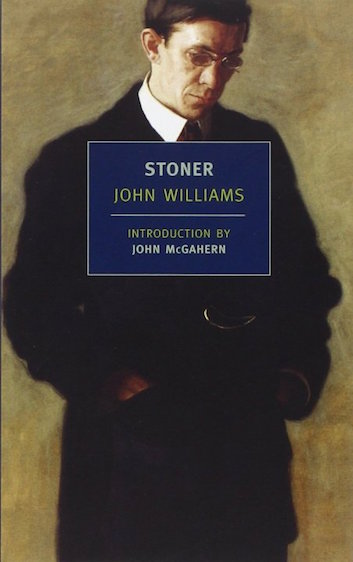
Although John Williams’s novel “Stoner” was first published in 1965, it seems to be having a resurgence these days in North America, and apparently became a bestseller in Europe in 2013. Go figure. It happened by word-of-mouth or what have you. New readers like me took to it through recommendations or book clubs and are passing along the word. I’ve seen “Stoner” talked about on various blogs and read it last week for my book club, which plans to discuss it later this month.
It’s still a bit mystifying how this quiet, grim novel grabbed the limelight, but I got caught up in the book, too, which is not hard to follow. It’s about a farm boy in the early 20th century, named William Stoner, whose dirt-poor parents send him to the University of Missouri to study agriculture, but he winds up being captivated by English literature instead. He takes to scholarly life and becomes a professor at the university, starting his career just before World War I.
The novel follows Stoner’s years there through retirement, capturing his joy of teaching but also the various disappointments he encounters along the way from his cold marriage and family life to circumstances that embroil him within the English department. He doesn’t seem to be able to catch a break. Even a love affair that makes him happy has its consequences.
It’s a bit bleak, the story, you feel for Stoner who is a shy, dedicated soul who doesn’t deserve the obstacles he faces. Yet what makes the novel so gratifying are the passages and truths about love and life that the author conveys. He cuts to the heart of it, without fanfare or sentiment. I wanted to mark and underline certain paragraphs but alas I had a library copy and couldn’t. I will have to get my own.
Another gratifying part is Stoner’s love of literature — his awakening to it, which brings him an awareness of his self. I adored this theme, what fan of reading wouldn’t? Literature is the one thing in the end that doesn’t seem to betray him. The novel reminded me slightly of Chaim Potok’s novel “The Chosen” because of Stoner’s intellectual awakening and scholarlyness through out, but it’s also mixed a bit with the grimness of perhaps a Richard Yates’ novel, one like “Revolutionary Road.” The novel “Stoner” is definitely a quiet, but affecting read, and one I will likely take up again in the years ahead. I only wish they hadn’t titled it “Stoner” because in my opinion it doesn’t really do the book justice.
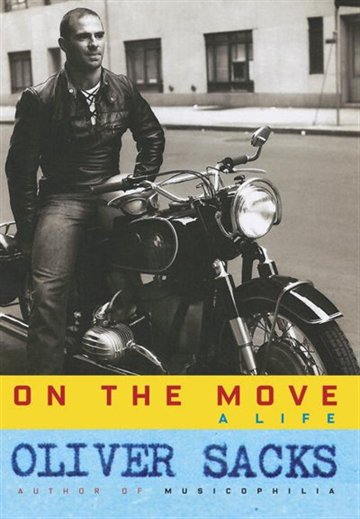
I also finished this week Oliver Sacks’s autobiography “On the Move: A Life.” I listened to it as an audiobook as I walked my dog. As you might know, Sacks passed away last month at the age of 82. He was a well-known neurologist who worked with patients with various disorders and illnesses, which he wrote about in such books as “Awakenings” (1973) and “The Man Who Mistook His Wife for a Hat” (1985) among others.
I hadn’t read those, but I picked up “On the Move” because I thought his life would be quite full and fascinating to hear about, and indeed it was. In it, Sacks traces the experiences and adventures from his childhood in Britain in the 1940s and ’50s with his parents who were both doctors and his schizophrenic brother — to his medical residency and fellowships in California in the early ’60s where he took long motorcycle excursions and was a weightlifter on Muscle Beach in Venice — to his work and case studies thereafter at hospitals in New York City.
On top of that he relates his passion for open-water swimming, writing, traveling, and those close to him. He reveals his life as a gay man and apparently he went through a period of celibacy that lasted 35 years. It’s interesting to hear too of his friendships with the poet W.H. Auden, and scientists Francis Crick, and Stephen Jay Gould among others, as well as his time hanging out with Robert De Niro and Robin Williams from the movie inspired by his book “Awakenings.”
“On the Move” includes a lot about the neurological cases Sacks treated including patients with encephalitis lethargica, deafness, color blindness, autism, Parkinson’s, and Tourette syndrome. I learned a bit about these from the book and got a sense of how Sacks sympathized and bonded with his patients. He seemed to give them a voice and the care they so desperately needed long before many institutions did.
As much as he was a doctor, Sacks was also a writer and storyteller, filling hundreds of notebooks with writings, and publishing more than a dozen books. He seemed to have a voracious love of learning and was always involved in new things, which is evident in “On the Move.” All of this makes for a sprawling but vibrant and revealing account of his notable life journey. My only wish was that Oliver Sacks had read it himself for the audiobook instead of American actor Dan Woren, but nonetheless it still made for an entertaining and illuminating listen.
What about you — have you read John Williams’s novel “Stoner” or any of the books by Oliver Sacks — and if so, what did you think? Continue reading
Posted in Books
21 Comments
September Preview
I want to wish everyone a very enjoyable Labor Day weekend and happy barbecuing. I feel a bit weepy though that summer is ending soon. Ugh, it’s already getting cold here in the mornings. But September is my favorite time of year because, for one thing, it’s my birthday month, and for another, it’s always so gorgeous wherever you are. It’s also one of the biggest months of the year for new releases in books, movies, and music. So I’ve been wading through all the titles and artists, and we have plenty to discuss.

First off, there’s a few big-name authors with books out this month, namely Salman Rushdie, Margaret Atwood, and of course Jonathan Franzen. I admit I haven’t read Franzen’s two other pillars of Lit, which he’s known for, namely “The Corrections” (2001), and “Freedom” (2010), but I have read his tome of essays called “How to Be Alone” (2002). Now his new novel “Purity” is out and I’m wondering if I should experience it. The critics really like it, but what do you say? Is it accessible, and is it good?
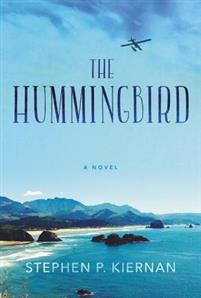
Meanwhile there’s a few other authors I’ve liked in the past who have new books out, specifically Ron Rash with “Above the Waterfall,” William Boyd with “Sweet Caress,” and Stephen P. Kiernan with “The Hummingbird.” You might recall Kiernan’s debut novel “The Curiosity” from 2013 about a man frozen in ice for a century who’s brought back to life. I enjoyed it, so I’d like to see where Kiernan goes with “The Hummingbird,” which apparently is about a hospice nurse who tries to help her husband overcome the demons he suffers from his deployments in Iraq. Count me in.
Meanwhile we haven’t even talked about sequels yet and two popular authors have novels out this month that complete their series. First, Italian author Elena Ferrante has Book Four out of her Neapolitan Novels called “The Story of the Lost Child.” It’s the final volume in her series about two lifelong friends, Elena and Lila. I haven’t read any of them yet, but I’ve heard really good things about them so far, so I plan to check them out in the future.
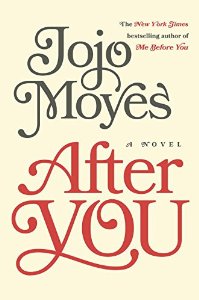
The other big sequel coming this month is Jojo Moyes’s follow-up to her 2012 hit novel “Me Before You,” which paired Louisa Clark with Will Traynor, a quadriplegic from an accident. Many of Moyes’s fans seem ecstatic that the author is returning with a sequel called “After You,” but others think without Will Traynor why return with another. I admit to liking Will’s character the best in the first book and wonder if a sequel was necessary. What do you think?
I’ve also got my eyes on reading Hester Young’s debut novel “The Gates of Evangeline” which has been called a Southern Gothic mystery and is about a journalist who gets involved in a missing child case from long ago. It’s quite popular now and I look to snatch up a copy.

Another highly praised debut novel is Bill Clegg’s “Did You Ever Have a Family,” which, according to Amazon, is “a story about a circle of people who find solace in the least likely of places as they cope with a horrific tragedy.” Judging from all the positive comments about Clegg’s book, I need to obtain a copy pronto and devour it soon.
Lastly in books out this month, I’d probably be remiss not to mention Chrissie Hynde’s memoir “Reckless: My Life as a Pretender,” which I’m sure will be quite a colorful account of her years as a seminal rock star. I was a big fan of her early music with The Pretenders so I need to check out her raw tell-all story as soon as I can.
For movies this month, there’s a couple of comedies that look halfway decent: “The Intern” with Anne Hathaway and Robert DeNiro, and “A Walk in the Woods” with Robert Redford and Nick Nolte. Though I’m not sure the movie of “A Walk in the Woods” will come close to Bill Bryson’s 1998 classic of it. The movie seems like a different version of it, a bit weaker, with older characters. I’m worried it will miss the mark by a large margin.
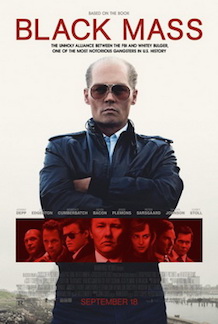
Meanwhile a couple of true-story dramas look very enticing. First Tobey Maguire plays U.S. chess champion Bobby Fischer in the story about his match-up with Russian Boris Spassky in “Pawn Sacrifice.” And then there’s “Black Mass,” with Johnny Depp starring as notorious crime boss Whitey Bulger and Benedict Cumberbatch as his brother Bill. It looks pretty creepy, but I know I’ll likely have to see it.
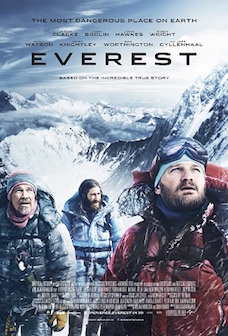
But if it’s action-adventure you want, “Everest” will likely be your pick. It’s another movie based on the 1996 Mount Everest disaster in which a number of climbers were caught in a blizzard near the top of the mountain. If you recall Jon Krakauer’s book “Into Thin Air,” then you know what I’m talking about — chaos on the mountain in terrible conditions that turns into a nightmare. You remember it now. This movie has Jake Gyllenhaal as mountain guide leader Scott Fischer and stars a number of other well-known actors. I plan to weather the storm and see it.

Lastly for September, there’s new albums out by veteran artists Keith Richards, Don Henley, Duran Duran, Shawn Colvin, and Jewel among others. But I got to go with Glen Hansard’s new one “Didn’t He Ramble” and Patty Griffin’s “Servant of Love” as my picks for this month.
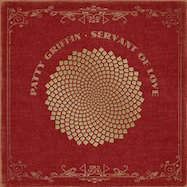
Check them out if you get a chance.
How about you — which books, movies, or albums out this month are you most looking forward to?
Continue reading
Posted in Top Picks
24 Comments
Between You & Me
Last week the smoke coming from wildfires in Washington state, Idaho, Montana, and British Columbia was brutal here. The sky was perpetually gray and you couldn’t go outside long without your eyes and lungs burning. I can only imagine how bad it was in the places where the fire actually was. Now finally the blue sky has returned and I’m no longer taking oxygen or the sky’s color for granted. I just hope rain will come soon to the areas still ignited in flames. This has been a particularly harsh summer for wildfires out West, and it’s made me look forward for once to cooler fall temps.
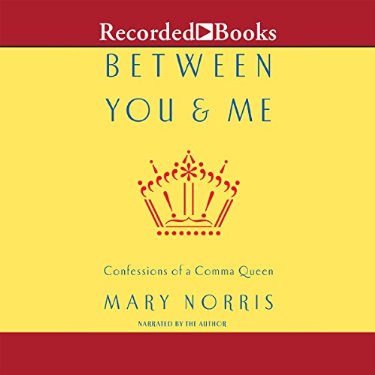
Meanwhile, my last book for August was Mary Norris’s 2015 memoir and grammar usage book “Between You and Me: Confessions of a Comma Queen.” I listened to it as an audiobook narrated by the author, which was great as I felt like I got a better sense of what Mary Norris is like. She’s definitely a hoot and seems eccentric in her grammarian ways and interests.
If you haven’t heard of this book or her, Mary Norris has been a copy editor and proofreader at The New Yorker magazine since 1978. She’s still there, holding fort over all the minutiae — particularly the style and grammar that goes into the mag. Her book reveals some anecdotes of her days at the magazine, but mainly it delves into usage issues, such as spelling, punctuation, that vs. which, pronouns and antecedents, and dangling modifiers, among other things. One needs to be quite taken with the particulars of punctuation and grammar to keep interested in this book because at times Norris can go on and on about a single example or topic, seemingly not knowing exactly when to stop.
I didn’t mind though because I worked for many years at a newspaper as a copyeditor myself so I used to deal with these things on a nightly basis. It gets ingrained in your bones — all the tiny details, where you have to catch everything and eliminate all the errors and put words into the style of the publication’s. It can be tough and hair-raising on deadline. Afterwards, you often wake up in the middle of the night worrying whether you made a “fix,” or if you think something slipped through. I remember those caffeinated late nights and some that gave me ulcers or at least felt like it.
But the best parts of “Between You and Me” aren’t really all the grammar schooling that’s in it, but more the anecdotes Norris shares of various writers and their particular style traits. She touches on the poet Emily Dickinson and her use of dashes, the life of lexicographer Noah Webster, and the writing of Herman Melville, particularly the mystery over who put the hyphen in the title of “Moby-Dick.” She mentions her dealings over the copy of writers Philip Roth, George Saunders, James Salter, and Pauline Kael among others. These are the parts I really enjoyed. I also liked the bits about her personal life and her work life of what it’s been like at The New Yorker. I would have liked more of this memoir-type stuff and less about usage rules.
In particular two chapters towards the end of “Between You and Me” could have been subbed out in my opinion for other material. In one, Norris includes a whole chapter on the usage of profanity in copy that is laced with … well, a lot of profanity that turns out not to be that enlightening. In the other, Norris writes about her fettish for pencils and pencil sharpeners, which I guess I found a bit amusing and charming. But then she really gets into the details of both. I’m not kidding, I haven’t heard or thought so much about pencils since grade school, and likely not back then either, LOL. Wow that’s when I thought “Whoa she’s pretty eccentric” … but not exactly in a bad way.
Still I was quite entertained by listening to Norris read “Between Me and You.” I laughed quite often and agreed with her on much of her wisdom and insight. She comes off as pretty down-to-earth, modest, salty, funny, and not snooty like one might think of a longtime reference guru. I think that’s what really won me over. She includes errors she’s made and doesn’t sound like a bossy know-it-all. (As long as you don’t write or say “between you and I,” she probably won’t go too batty.) For that, “Between Me and You” is a refreshing read among the recent spate of style and usage books that at times come across too heavy-handed in their righteousness or correctness.
What about you — have you read or heard of Mary Norris’s book — and if so what did you think of it? Or have you liked any other books on style and usage? Continue reading
Posted in Books
10 Comments
Girl in Glass / Review & Giveaway
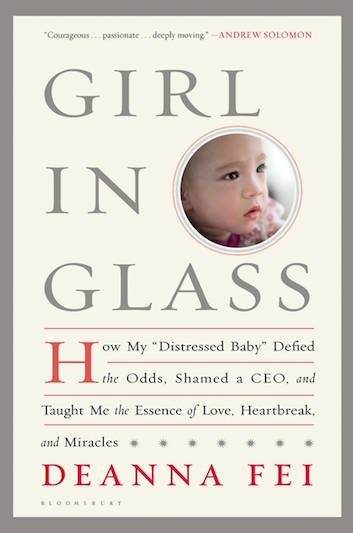
I’m not a mother, nor have I read many childbirth books, but I snapped up a review copy of Deanna Fei’s 2015 memoir “Girl in Glass: How My ‘Distressed Baby’ Defied the Odds, Shamed a CEO, and Taught Me the Essence of Love, Heartbreak, and Miracles” because I was curious about what the author and her family had endured and had to say. I wasn’t aware beforehand that she and her baby had been in the news in 2014 after AOL’s CEO had signaled out her baby’s healthcare costs, along with another’s, as a reason why he was cutting the company’s employee benefits. (More on this in a bit.)
Instead I picked up the book blind, whipping through the first half of the memoir, which is a nail-bitting account of how the pregnant author woke up one morning to find herself in labor at 25 weeks — over three months ahead of her due date. It hadn’t been a high-risk pregnancy; she had given birth to a healthy boy just a year earlier, and the new baby, a girl, was on schedule and healthy, according to her doctors. But for unknown reasons, the baby girl came very prematurely, weighing just 1 lb, 9 oz after being delivered by an emergency caesarean section. As a result, she was kept in intensive care for months and underwent various health complications.
“Girl in Glass” navigates the parents’ journey, specifically the mom’s, through these incredibly difficult and uncertain times. It’s very open and personal about her fears, her marriage, and the guilt over why the premature birth happened and her thoughts of whether the baby should be “let go.” She describes her and her husband’s harried lives commuting back and forth from their Brooklyn home caring for their lively boy, back to the Manhattan hospital where their daughter lay in a glass isolette hooked up to a contraption of wires. There’s times the author seems to be on the verge of a breakdown, unable to sleep and endlessly pumping milk to try and feed her tiny daughter. You can only hope beyond hope for the baby’s survival and improvement.
Towards the end of “Girl in Glass,” the author delves into a 2012 incident at a town hall meeting in which her husband’s then-employer, the CEO of AOL, blamed the healthcare costs of covering two “distressed babies” for the reason the company was cutting employee retirement benefits. Many surmised he was talking about their daughter, which he was. The whole thing, which seems terribly offensive and illegal — that of a CEO meddling in employees’ health expenditures and disclosing others’ medical information under the label of “distressed babies” — caused a national uproar and led the author to rebut him in an essay on Slate, ultimately earning the CEO’s apology.
At the end, “Girl in Glass” raises a lot of pertinent issues surrounding both premature babies and medical privacy infractions, which I found quite illuminating and relevant considering both are on the rise. Author Deanna Fei also lays out the history of neonatal care and today’s guidelines on which preemies are usually saved; at her daughter’s birth at 25 weeks, only half of the babies are said to survive, and many of those are disabled. Fei’s story packs a wallop for her candor during her daughter’s struggles, and is informative about issues that many of us never imagine, or plan on, could happen to our families.
What about you — have you heard of “Girl in Glass” or this author’s circumstances — and if so, what do you think? Or do you know of similar circumstances?
Thanks to Tandem Literary and Bloomsbury for providing me with a copy of “Girl in Glass” to review.
For those interested in the book, I have one copy to giveaway, just leave your interest in the comments and I will randomly draw a winner. Continue reading
Posted in Books
12 Comments
My Sunshine Away
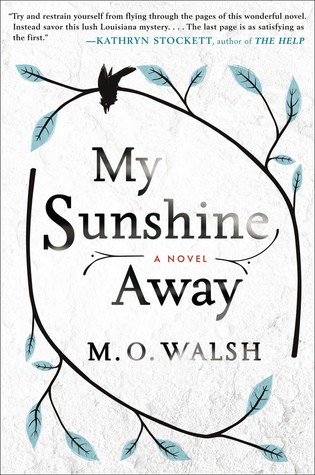
A hardback library copy of M.O. Walsh’s 2015 debut novel “My Sunshine Away” accompanied me on vacation as my husband and I traveled over hill and dale recently through parts of Vermont, New Hampshire, and Quebec. We were attending a family reunion for a few days and then took a bicycle trip, and luckily the book did not get rain damaged in my bike pannier, though a paperback copy probably would have been easier to lug.
I’ve been surprised to see some readers refer to “My Sunshine Away” as a crime or mystery novel. Although a crime does take place in it that is eventually solved, to me it’s much more a coming-of-age tale set in the South. And I for one, find it hard to resist really good coming-of-age stories — whether it’s “To Kill a Mockingbird” or “The Catcher in the Rye” or Michael Chabon’s “The Mysteries of Pittsburgh,” or this one, I feel the need to consume it rather completely.
For those who haven’t heard, “My Sunshine Away” is about an adolescent boy growing up in Baton Rouge, Louisiana, whose life changes when a girl that he has always had a crush on is raped in his quiet suburban neighborhood in the summer of 1989. He’s so obsessed with the girl, Lindy, that he ends up becoming a suspect in her assault. Yet later he and Lindy bond after his family suffers a tragedy. What happens to their relationship collides at the end with an attempt to solve her rape case.
Judging by comments on Goodreads, people had a pretty diverse reaction to this novel, most really liking it, while others did not. I think some readers had problems of being stuck inside the mind of an adolescent boy who’s totally obsessed with the girl next door. His infatuation perhaps gets too much or endless for some. But I think the kid, a young sort of lost teen, is trying to find himself — a bit like Holden Caulfield in “The Catcher in the Rye” — and find his way in that specific corner of the world in Baton Rouge. He’s going through tough stuff: his parents become divorced, his family suffers a tragedy, he’s desperate for a girl. He narrates as he learns looking back at these years, what it meant, and how the crime of her rape affected him and the whole neighborhood.
I found the story quite immersive and moving, and amusing in places despite it’s dark subject matter. I thought a lot of the writing was wonderful, and two chapters in particular stuck out for me. In one he describes what happens at school the day the Space Shuttle Challenger blew up in 1986, which is quite a scene. In the other he tells how Baton Rouge differs from New Orleans, and what happens later in life in the aftermath of Hurricane Katrina. The novel’s sense of place and time, specifically for the South in the 1980s, is terrific throughout.
I would highly recommend “My Sunshine Away” for readers who especially like coming-of-age tales, or stories set in the South. Enjoy this quirky heartfelt gem.
Posted in Books
22 Comments
Summer Break

I’ve been away this past week and unplugged of gadgetry. My Hub and I are bicycling in Quebec on a self-supported tour and are enjoying the scenery. I plan to be back shortly after a few final days exploring Montreal. So I will talk to you soon. Meanwhile happy trails and reading. I’m interested to hear what books you are delving into this week and what you think of them? Continue reading
Posted in Daily Cue
22 Comments
